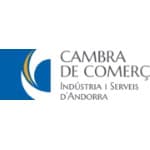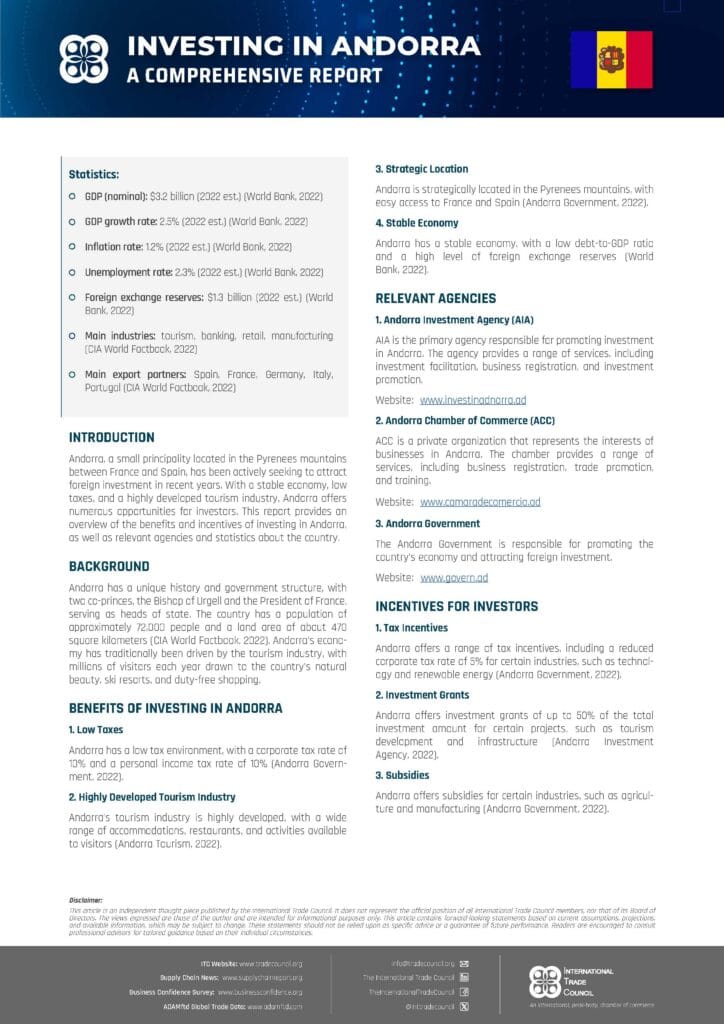- Type of Government: Parliamentary co-principality
- Population: Approximately 79,000
- GDP: Around $3.15 billion USD
- Corporate Tax Rate: 10%
- Personal Income Tax Rate: Up to 10%
- Major Exports: Tobacco products, furniture, and electric machinery
- Major Imports: Consumer goods, food, and fuel
Doing Business with Andorra
A comprehensive guide to doing business, exporting, investing, and manufacturing in Andorra.
-
Research Market Demand
- Understand the demand for your product in Andorra.
- Use resources like Export.gov for market research.
-
Understand Regulations
- Familiarize yourself with Andorra’s import regulations and standards.
- Visit Andorra Customs for detailed information.
-
Obtain Necessary Certifications
- Ensure your product meets Andorra’s regulatory and safety standards.
- Contact relevant certification bodies if needed.
-
Find a Local Partner or Distributor
- Establish relationships with local distributors or agents.
- Consider visiting trade shows or business directories.
-
Prepare Export Documentation
- Prepare necessary documents such as commercial invoices, packing lists, and certificates of origin.
- Check requirements with Andorra’s Chamber of Commerce.
-
Arrange Shipping and Logistics
- Choose reliable freight forwarders familiar with Andorra.
- Ensure compliance with shipping requirements and packaging standards.
-
Calculate Costs and Pricing
- Factor in tariffs, taxes, and shipping costs.
- Use tools like duty calculators available on customs websites.
-
Market Your Product
- Develop a marketing strategy tailored to Andorran consumers.
- Utilize digital marketing and local advertising.
-
Finalize Deals and Contracts
- Negotiate and finalize contracts with clear terms and conditions.
- Consider legal advice to ensure compliance with local laws.
-
Stay Updated on Legal Changes
- Regularly check for updates in trade laws and regulations.
- Subscribe to newsletters from Andorra Business.
Key Contacts
- Andorra Customs: Duana d’Andorra Website
- Andorra Chamber of Commerce: CCIS Website
- Andorra Business: Andorra Business Website
-
Research Import Regulations
- Understand Andorra’s import rules and regulations.
- Visit Andorra Customs for detailed guidelines.
-
Register Your Business
- Ensure your business is registered to import goods.
- Contact local authorities for business registration requirements.
-
Classify Your Goods
- Determine the correct Harmonized System (HS) codes for your products.
- This classification affects duties and taxes.
-
Obtain Necessary Licenses
- Check if your goods require special licenses or permits.
- Contact relevant regulatory bodies for specific product requirements.
-
Calculate Import Duties and Taxes
- Use duty calculators to estimate costs.
- Refer to customs for accurate duty rates.
-
Find a Customs Broker
- Consider hiring a customs broker to facilitate the import process.
- They can help with paperwork and compliance.
-
Arrange Shipping and Logistics
- Choose a reliable logistics provider familiar with Andorran imports.
- Ensure your goods comply with packaging and labeling standards.
-
Prepare Import Documentation
- Collect all necessary documents like invoices, bills of lading, and certificates of origin.
- Ensure accuracy to avoid delays.
-
Submit Import Declaration
- File an import declaration with Andorra Customs.
- This step is crucial for legal entry of goods.
-
Clear Customs
- Ensure all duties and taxes are paid.
- Work with customs officials to clear your goods.
-
Transport and Store Goods
- Arrange for transportation from the port of entry to your warehouse.
- Ensure proper storage facilities are available.
Key Contacts
- Andorra Customs: Duana d’Andorra Website
- Andorra Chamber of Commerce: CCIS Website
- Andorra Business: Andorra Business Website
-
Choose a Business Structure
- Decide on the type of company (e.g., Public Limited Company, Private Limited Company).
-
Reserve a Company Name
- Check the availability of your desired company name.
- Reserve it through the Andorran Company Registry.
-
Draft the Articles of Association
- Prepare the legal document outlining the company’s structure and rules.
-
Open a Bank Account
- Open a corporate bank account in Andorra.
- Deposit the required minimum share capital.
-
Register the Company
- Submit the necessary documents to the Andorran Company Registry.
- Include the Articles of Association and proof of share capital.
-
Obtain a Business License
- Apply for the appropriate business license from local authorities.
- Ensure compliance with sector-specific regulations.
-
Register for Taxes
- Register for corporate taxes with the Andorran Tax Authority.
- Obtain a tax identification number.
-
Enroll in Social Security
- Register your company with the CASS (Andorran Social Security System).
- Ensure compliance with employee social security obligations.
-
Comply with Employment Laws
- Understand and comply with Andorra’s labor laws.
- Prepare employment contracts and workplace policies.
-
Start Operations
- Once all registrations and licenses are in place, commence business operations.
Costs
- Company Registration Fee: Varies depending on the business type.
- Minimum Share Capital: Typically around â‚ ¬3,000 for a Private Limited Company.
- Legal and Notary Fees: Varies based on services required.
Key Contacts
- Andorran Company Registry: Govern d’Andorra Website
- Andorran Tax Authority: ATC Website
- CASS (Social Security): CASS Website
-
Conduct Feasibility Study
- Assess market demand, costs, and local conditions.
- Identify potential locations and resources.
-
Choose a Business Structure
- Decide on the legal form of your business (e.g., Limited Company).
-
Register Your Company
- Register with the Andorran Company Registry.
- Submit necessary documents, including Articles of Association.
-
Secure Financing
- Arrange financing through banks or investors.
- Prepare a detailed business plan.
-
Select a Site
- Choose a suitable location for your plant.
- Ensure compliance with zoning and environmental regulations.
-
Obtain Permits and Licenses
- Apply for construction and operation permits.
- Contact local municipalities for specific requirements.
-
Design and Construct the Facility
- Hire architects and contractors to design and build the plant.
- Ensure adherence to safety and building codes.
-
Install Machinery and Equipment
- Purchase and install necessary manufacturing equipment.
- Set up systems for production efficiency.
-
Hire and Train Employees
- Recruit skilled workers for your plant.
- Provide training to ensure safety and productivity.
-
Comply with Environmental and Safety Regulations
- Implement measures for waste management and pollution control.
- Follow workplace safety regulations.
-
Begin Operations
- Start production and monitor processes.
- Continuously evaluate and optimize operations.
Key Contacts
- Andorran Company Registry: Govern d’Andorra Website
- Andorran Tax Authority: ATC Website
- CASS (Social Security): CASS Website
- Andorra Business: Andorra Business Website
-
Conduct a Trademark Search
- Check existing trademarks to ensure yours is unique.
- Use databases or consult with a legal expert for assistance.
-
Prepare Your Application
- Gather required information: trademark representation, list of goods/services, and applicant details.
-
Submit Your Application
- File your application with the Andorran Intellectual Property Office.
- Ensure all documents are complete and accurate.
-
Pay the Application Fee
- Fees vary based on the type and number of classes.
- Check with the Intellectual Property Office for exact costs.
-
Examination Process
- The office will examine your application for compliance and conflicts.
- Respond promptly to any requests for additional information.
-
Publication and Opposition
- Your trademark will be published for a period where third parties can oppose.
- Address any oppositions if they arise.
-
Registration and Issuance
- If successful, receive a certificate of registration.
- Your trademark is now protected under Andorran law.
-
Maintain and Renew Your Trademark
- Trademarks need renewal every 10 years.
- Monitor for any infringements and ensure timely renewals.
Costs
- Application Fee: Varies based on classes and complexity.
- Legal Fees: Consider hiring a trademark attorney for guidance.
Key Contacts
- Andorran Intellectual Property Office: OMPA Website
-
Initial Negotiation
- Attempt to resolve the dispute through direct negotiation between parties.
- Consider mediation as a cost-effective first step.
-
Mediation and Arbitration
- Use mediation services for an informal resolution.
- Consider arbitration for a binding decision outside the court system.
-
Legal Consultation
- Consult with a legal expert specializing in Andorran commercial law.
- Evaluate your options and potential outcomes.
-
File a Lawsuit
- If necessary, file a lawsuit in the appropriate Andorran court.
- Prepare all relevant documentation and evidence.
-
Court Proceedings
- Attend court hearings and present your case.
- Follow the court’s procedures and timelines.
-
Judgment and Enforcement
- If a judgment is issued, ensure compliance by the opposing party.
- Use legal enforcement mechanisms if necessary.
-
Appeal Process
- If dissatisfied with the judgment, consider filing an appeal.
- Follow specific procedures and deadlines for appeals.
Costs
- Mediation/Arbitration Fees: Varies based on the complexity and service provider.
- Legal Fees: Depends on the lawyer and case complexity.
- Court Fees: Incurred during filing and proceedings.
Key Contacts
- Andorran Courts: Justice of Andorra Website
- Andorra Chamber of Commerce: CCIS Website
- Mediation Services: Contact local legal firms for available services.
Social and Cultural Factors
- Language: Catalan is the official language, but French and Spanish are also widely spoken.
- Business Etiquette: Personal relationships and trust are important. Initial meetings often involve getting to know each other.
- Consumer Preferences: Understanding local tastes and preferences is crucial for market success.
Political Environment
- Stability: Andorra is known for its political stability, which is conducive to business operations.
- Government Structure: A parliamentary co-principality with a focus on tourism and finance.
Economic Environment
- Currency: Euro (EUR) is used, providing stability and integration with European markets.
- Foreign Investment: Andorra encourages foreign investment, especially in tourism, retail, and finance sectors.
Legal and Regulatory Framework
- Rule of Law: Strong legal framework with protections for businesses and investors.
- Regulatory Environment: Generally business-friendly, but it’s important to comply with local laws and regulations.
Foreign Exchange
- Currency Risks: Minimal, as Andorra uses the Euro. Businesses benefit from stable exchange rates within the Eurozone.
Infrastructure
- Transport: Limited public transport; reliance on road connections with Spain and France.
- Digital Infrastructure: High internet penetration and modern communication systems.
Additional Considerations
- Taxation: Competitive tax rates with low personal and corporate taxes.
- Workforce: Skilled labor is available, but sourcing locally might be necessary for specific industries.
Relevant URLs
- Andorra Business: Andorra Business Website
- Andorran Government: Govern d’Andorra Website
- Chamber of Commerce: CCIS Website
Ask our Experts on Doing Business in/with Andorra
If you’re looking to do business or invest in Andorra, we can provide expert guidance, market insights, and valuable connections to help you navigate the local landscape. Contact us today to discover how we can assist in making your venture a success.





